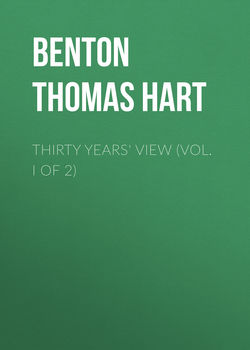Читать книгу Thirty Years' View (Vol. I of 2) - Benton Thomas Hart - Страница 20
CHAPTER XVII.
PRESIDENTIAL AND VICE-PRESIDENTIAL ELECTION IN THE ELECTORAL COLLEGES
ОглавлениеFour candidates were before the people for the office of President – General Jackson, Mr. John Quincy Adams, Mr. William H. Crawford, and Mr. Henry Clay. Mr. Crawford had been nominated in a caucus of democratic members of Congress; but being a minority of the members, and the nomination not in accordance with public opinion, it carried no authority along with it, and was of no service to the object of its choice. General Jackson was the candidate of the people, brought forward by the masses. Mr. Adams and Mr. Clay were brought forward by bodies of their friends in different States. The whole number of electoral votes was 261 of which it required 131 to make an election. No one had that number. General Jackson was the highest on the list, and had 99 votes; Mr. Adams 84; Mr. Crawford 41; Mr. Clay 37. No one having a majority of the whole of electors, the election devolved upon the House of Representatives; of which an account will be given in a separate chapter.
In the vice-presidential election it was different. Mr. John C. Calhoun (who in the beginning of the canvass had been a candidate for the Presidency, but had been withdrawn by his friends in Pennsylvania, and put forward for Vice-President), received 182 votes in the electoral college, and was elected. Mr. Nathan Sandford, Senator in Congress from New-York, had been placed on the ticket with Mr. Clay, and received 30 votes. The 24 votes of Virginia were given to Mr. Macon, as a compliment, he not being a candidate, and having refused to become one. The nine votes of Georgia were given to Mr. Van Buren, also as a compliment, he not being on the list of candidates. Mr. Albert Gallatin had been nominated in the Congress caucus with Mr. Crawford, but finding the proceedings of that caucus unacceptable to the people he had withdrawn from the canvass. Mr. Calhoun was the only substantive vice-presidential candidate before the people, and his election was an evidence of good feeling in the North towards southern men – he receiving the main part of his votes from that quarter – 114 votes from the non-slaveholding States, and only 68 from the slaveholding. A southern man, and a slaveholder, Mr. Calhoun was indebted to northern men and non-slaveholders, for the honorable distinction of an election in the electoral colleges – the only one in the electoral colleges – the only one on all the lists of presidential and vice-presidential candidates who had that honor. Surely there was no disposition in the free States at that time to be unjust, or unkind to the South.
